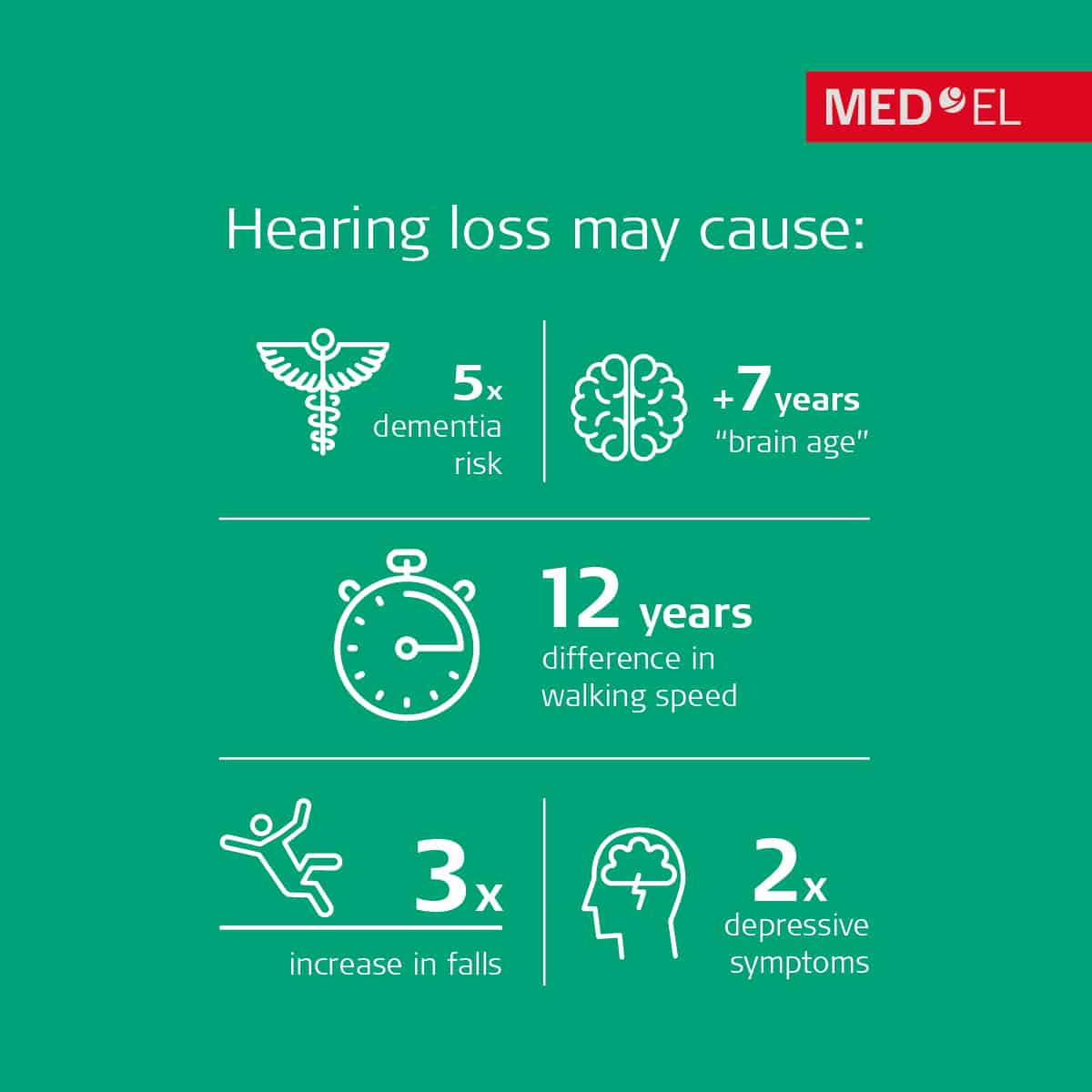
MED-EL
Published Dec 12, 2023
Can Older Adults Benefit From Cochlear Implants?
Are you an older adult with hearing loss? Getting a cochlear implant may help you access sound—and enjoy a better quality of life.

Hearing loss is very common in older adults. Among people in their 60s, 15.4% have moderate hearing loss or higher.Rehabilitation, S. F. D. A. (2021, March 3). World report on hearing. https://www.who.int/publications/i/item/9789240020481[1] And among people older than 90, 58.2% have this level of hearing loss.Rehabilitation, S. F. D. A. (2021, March 3). World report on hearing. https://www.who.int/publications/i/item/9789240020481[1] If you have moderate hearing loss, you will struggle to hear spoken conversations or even the phone ringing. With more severe hearing loss, you may even be unable to hear traffic sounds, as shown on this audiogram. Even the most powerful hearing aids don’t offer enough support if you have severe-to-profound hearing loss. But cochlear implants may be able to give you access to sound.
Age-related hearing loss—the gradual loss of hearing over time in both ears—is very common. As technology improves and world health increases, the elderly population grows. By 2050, people over 65 years old are predicted to make up 17% of the total world population.United Nations. (n.d.). International Day of Older Persons | United Nations. https://www.un.org/en/observances/older-persons-day[2] As the world population ages, age-related hearing loss is also likely to increase. Even if you had good hearing when you were younger, you may gradually lose it as you age.
Hearing Loss Means More Than Just Missing Out on Sound
If you don’t do anything about your hearing loss, everyday life can become more and more tricky. You might find it harder to connect with friends and family, watch television or listen to music, run errands to the bank or pharmacy, talk to a doctor, and hear the phone and other important sounds.
Age-related hearing loss can also lead to frustrating feelings of isolation. It may even lead to depression and a decline in cognitive abilities, such as memory loss.

Recognizing Hearing Loss and Embracing Solutions
Treating hearing loss early may prevent some of these negative consequences. Cochlear implants are not only suitable for younger people, such as babies born deaf. They may also be an option for many older adults with severe-to-profound sensorineural hearing loss.
Cochlear implant surgery is typically a straightforward and routine operation that lasts between 1–2 hours and is performed under either general or local anesthesia. The first fitting of your audio processor usually takes place after about four weeks of recovery.
But the first step is recognizing the symptoms of hearing loss. Some signs can be noticed early if you pay close attention. Keep an eye (or an ear) out for these clues:
- Struggling to hear high-pitched sounds, such as children’s voices or the ringing of a phone
- Television, radio, or phone volume levels that are uncomfortable for people without hearing loss
- Difficulty understanding speech in busy places, such as shopping centers and restaurants
- Tinnitus, or ringing in the ears
- Lip-reading to compensate for lack of auditory speech understanding
When hearing loss remains untreated, it can have a significant negative impact. So if you’ve noticed that you or someone you love is developing hearing loss, be sure to address this issue. Being able to hear again can help you stay socially connected and restore your access to auditory stimulation, keeping your brain active.
Try to recognize hearing loss symptoms as they gradually emerge, and seek professional help before your hearing loss prevents you from enjoying daily life fully. Treating your hearing loss can help you maintain your independence.
Taking the Next Steps Toward Hearing Well Again
Start with this free online hearing test to help you figure out whether you might have hearing loss. Your primary care physician may be able to refer you to an ENT (ear, nose, and throat) specialist or an audiologist for a comprehensive hearing evaluation. Take a look at this article to find out more about this topic.
When hearing aids are not enough, hearing implants such as cochlear implants can be an effective solution. Check out all our hearing solutions to find the one that can help you or your loved one get back to hearing life.
References
-
[1]
Rehabilitation, S. F. D. A. (2021, March 3). World report on hearing. https://www.who.int/publications/i/item/9789240020481
-
[2]
United Nations. (n.d.). International Day of Older Persons | United Nations. https://www.un.org/en/observances/older-persons-day
References

MED-EL
Was this article helpful?
Thanks for your feedback.
Sign up for newsletter below for more.
Thanks for your feedback.
Please leave your message below.
Thanks for your message. We will reply as soon as possible.
Send us a message
Field is required
John Doe
Field is required
name@mail.com
Field is required
What do you think?
© MED-EL Medical Electronics. All rights reserved. The content on this website is for general informational purposes only and should not be taken as medical advice. Contact your doctor or hearing specialist to learn what type of hearing solution suits your specific needs. Not all products, features, or indications are approved in all countries.
Guerrino
December 31, 2023
Sono portatore di protesi bilaterale esterne , ho avuto la ricostruzione del timpano destro senza tranne beneficio ,l'orecchio sinistro ho il timpano sfondato, circa 7 anni fa' mi è stato impiantato la protesi via ossea lato sinistro , senza beneficio . Ho preso coscenza dell'impianto cocleare, ma stando al test tonale in gabina con protesi esterne ,le parole scandite anche con disturbo siano paragonabile ad una normale conversazione a distanza di un metro e mezzo , sono costretto quando vado alla posta,in banca, dal medico , o in altri uffici di importanza ,debbo essere accompagnato . La perdita riscontrata è di ipoucosia bilaterale grave profonda . Avendo 83 anni mi sono rassegnato alla mia perdita di udito anche se è progressivo nel tempo
MED-EL
January 02, 2024
Salve Guerrino, grazie per il commento e per aver condiviso la tua storia. Se vuoi parlarne con uno specialista del nostro team, senza impegno, puoi contattarci al +39 0471 25 01 31 o e-mail: ufficio.italia@medel.com. Oppure puoi compilare il modulo che trovi qui: https://www.medel.com/clinic-finder/clinic-finder-detail/medel-unita-locale-italiana. Saluti, Giulia
Elizabeth Moffat
February 24, 2024
I wear 2 hearing aids Im 68 yrs Dob 16/06/1955 How much will this cost and how soon could i get this I am really interested if price Is right
MED-EL
February 26, 2024
Dear Elizabeth, thank you for your comment. Product pricing varies depending by your country, in some insurance may take care of it. If you are in the UK and believe you might be a hearing implant candidate, you can contact the local MED-EL team via this contact form: https://www.medel.com/en-gb/contact-med-el. Otherwise you can use these contact details: Phone: +44 330 1235601 - Email: customerservice@medel.co.uk Kind Regards, Giulia
Giulia Canu
May 02, 2024
I am from Ireland,and have SSD,I can not get coclear implant in Ireland as only one hospital carries out this procedure,and can only carry out this procedure on children they are so under staffed but the HSE in Ireland may pay for my procedure in UK if I can find a hospital willing to do the coclear implant they will only work with public hospitals not private I would be extremely grateful if you could give me a list of hospitals that Carry out implant procedure,the HSE call it the TAS treatment abroad scheme.please if you can help me I would be grateful a friend of mine got it done in Germany I would rather get it done in UK Thanks Tony
Giulia Canu
May 02, 2024
Hi Tony, thanks for your comment. We recommend contacting your local MED-EL team directly as they can assist you with all your questions related to the surgery. Please get in touch with them via this form: https://www.medel.com/contact-med-el Kind regards, Gordana

MED-EL

MED-EL



Conversation
2 Comments